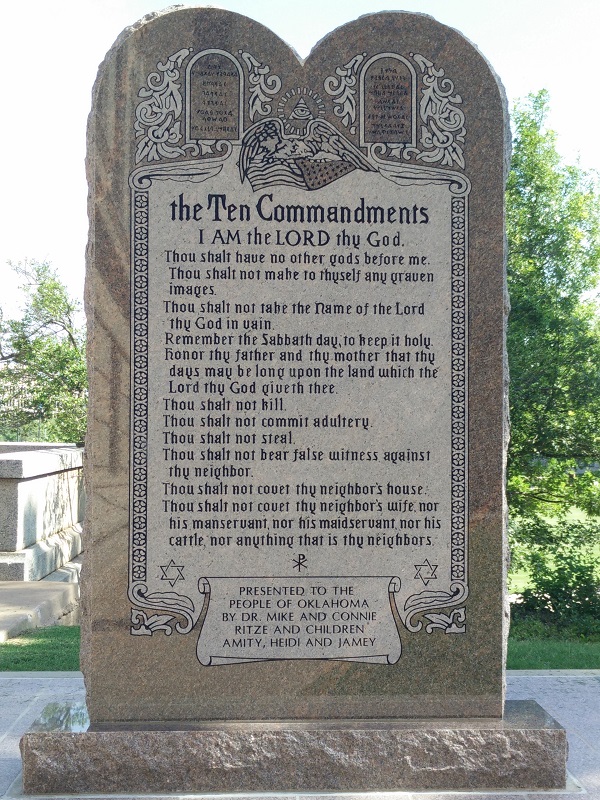The Oklahoma Ten Commandments should be coming down soon, assuming that our Governor understands that her duty is to enforce the law as written rather than decree what she thinks it should be. As a result of recent news coverage a couple people have asked me about the text itself, whether it comes from a Protestant, Catholic, or Jewish translation of the Hebrew scriptures into English.
The short answer is that most of the engraved text comes from the King James Bible, an Anglican work. I’ve reproduced the excerpted text from Exodus Chapter 20 below, bolding the portions included on the monument, and italicizing the parts that don’t quite match.
1 And God spake all these words, saying,
2 I am the Lord thy God, which have brought thee out of the land of Egypt, out of the house of bondage.
3 Thou shalt have no other gods before me.
4 Thou shalt not make unto thee any graven image, or any likeness of any thing that is in heaven above, or that is in the earth beneath, or that is in the water under the earth.
5 Thou shalt not bow down thyself to them, nor serve them: for I the Lord thy God am a jealous God, visiting the iniquity of the fathers upon the children unto the third and fourth generation of them that hate me;
6 And shewing mercy unto thousands of them that love me, and keep my commandments.
7 Thou shalt not take the name of the Lord thy God in vain; for the Lord will not hold him guiltless that taketh his name in vain.
8 Remember the sabbath day, to keep it holy.
9 Six days shalt thou labour, and do all thy work:
10 But the seventh day is the sabbath of the Lord thy God: in it thou shalt not do any work, thou, nor thy son, nor thy daughter, thy manservant, nor thy maidservant, nor thy cattle, nor thy stranger that is within thy gates:
11 For in six days the Lord made heaven and earth, the sea, and all that in them is, and rested the seventh day: wherefore the Lord blessed the sabbath day, and hallowed it.
12 Honour thy father and thy mother: that thy days may be long upon the land which the Lord thy God giveth thee.
13 Thou shalt not kill.
14 Thou shalt not commit adultery.
15 Thou shalt not steal.
16 Thou shalt not bear false witness against thy neighbour.
17 Thou shalt not covet thy neighbour’s house, thou shalt not covet thy neighbour’s wife, nor his manservant, nor his maidservant, nor his ox, nor his ass, nor any thing that is thy neighbour’s.
The text on the monument has two noticeable deviations from the KJV. It replaces “ox and ass” with the more generic term “cattle” which looks to be from Martin Luther’s Catechism, another Protestant work. Less significantly, the monument uses “make to thyself” in place of “make unto thee” in the prohibition on graven images, and that phrasing appears to come from the Anglican Book of Common Prayer. All in all, then, it is fair to say that the text we have etched in stone is a distinctly Protestant text.
One final point which I cannot let slide as a skeptic. The phrase near top of the monument in the largest font is taken from Exodus 34:28 where it refers to a distinctly different list of commandments.

